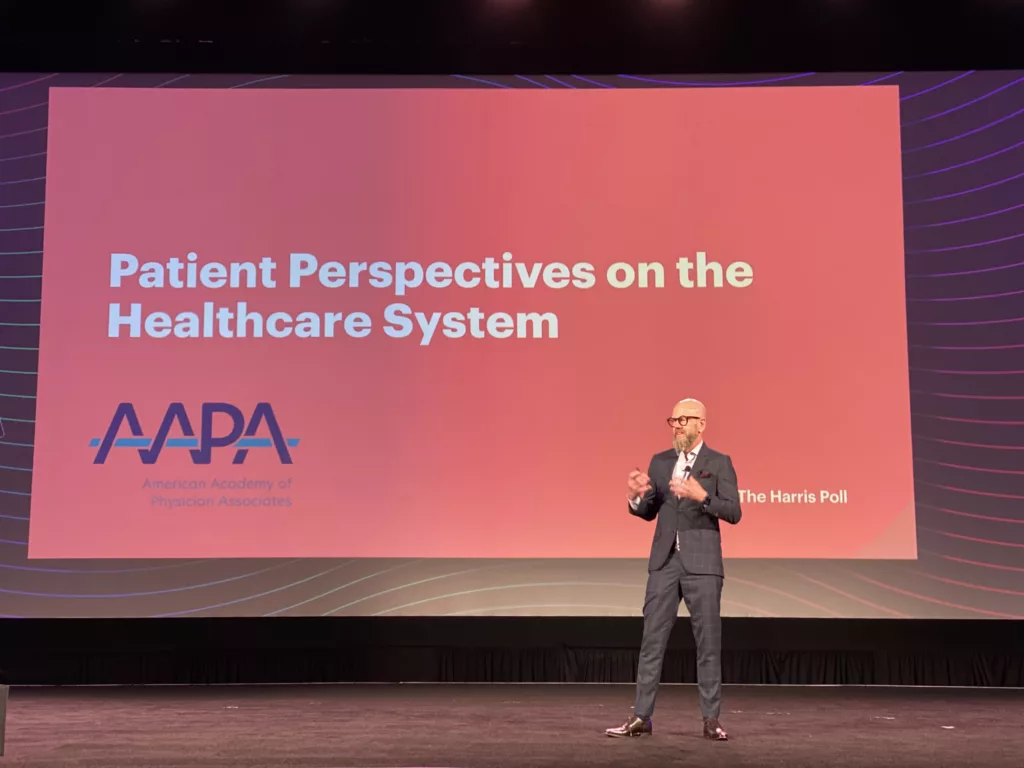The Harris Poll: Patients Agree PAs Add Value to U.S. Healthcare System
Patients Support PAs Practicing to Fullest Extent of Education, Training, Experience
May 20, 2023

By Dorsey Griffith
In findings that will not surprise the nation’s 168,000 PAs, a comprehensive Harris Poll commissioned by AAPA has found that Americans believe PAs add value to healthcare teams and are part of the solution to address the shortage of healthcare providers.
The survey, conducted among 2,518 U.S. adults Feb. 23-March, underscores the need for laws and regulations that allows PAs to practice to the fullest extent of their education, training, and experience. The survey results reflecting patient perceptions about PAs are part of a larger AAPA research effort to understand the current patient experience in the healthcare system, identify what patients feel is broken and the impact the broken system has on patients.
The Harris Poll found that most adults have seen a PA (68%), and nearly 6 in 10 have seen the same PA more than once. In findings that likely reflect personal experience with PAs, 93% of adults agree that PAs add value to healthcare teams; 45% strongly agree.
The patient perception findings align with AAPA’s vision: to transform health through patient-centered, team-based practice.
“I’m not surprised that The Harris Poll public opinion survey revealed overwhelming support for the role of PAs in the delivery of high-quality, team-based care,” said AAPA CEO Lisa M. Gables, CPA. “Our task now is to convince lawmakers and health systems to enable PAs to fully meet the growing demand for care by removing the handcuffs that prevent us from working to the full extent of our licenses.”
Similarly, The Harris Poll found that most adults feel confident about the quality of care that PAs provide and their role in shoring up the healthcare workforce. Over 90% of adults agree that PAs provide safe and effective health care and the same percentage agree PAs are part of the solution to address the healthcare provider workforce shortage.
Healthcare workforce shortages have been building for years for many reasons but were exacerbated by the COVID-19 pandemic, which led to burnout and resignation for many. The American Hospital Association predicts there will be a shortage of 3.2 million healthcare workers within the next few years.
In contrast, the PA profession is growing; PAs have long known that they are uniquely positioned to improve access and cost-effectiveness of care. Ranked the second-best healthcare job by U.S. News & World Report, PA employment is expected to grow 28% between 2021 and 2031, according to the Bureau of Labor Statistics.
The Harris Poll survey findings support the view that PAs can improve the quality, accessibility and cost-effectiveness of patient-centered healthcare. Nearly 80% of adults rate the medical care they received from their PA in the past 12 months as good or excellent, and nearly two-thirds would trust a PA to be their primary healthcare provider.
PAs were found to be knowledgeable and well-trained, have good communication skills and be respectful of their patients and their concerns. Patients with a relationship with a PA were more likely to give their healthcare an A than those who did not have a relationship with a PA (37% vs. 26%).
Public approval of PAs also reflects growing concerns about access to care and continuity of care, especially at a time in which the population is aging and chronic diseases are on the rise. Over 90% of adults support allowing PAs to provide care to the fullest extent of their education, training and experience and should be utilized to address workforce shortages.
Acknowledging that full use of all trained and educated healthcare providers improves patient health, 91% of adults support updating PA practice laws to enable them to provide that care.
“Our country is facing unprecedented healthcare challenges on multiple fronts,” Gables said. “As most Americans clearly agree, PAs are more than ready to be part of the solution.”
You May Also Like
The Patient Experience: Perspectives on Today’s Healthcare
U.S. Adults Spend Eight Hours Monthly Coordinating Healthcare, Find System “Overwhelming”
What Barriers Stand Between PAs and Rural Settings, MUAs, and HPSAs?
Thank you for reading AAPA’s News Central
You have 2 articles left this month. Create a free account to read more stories, or become a member for more access to exclusive benefits! Already have an account? Log in.



